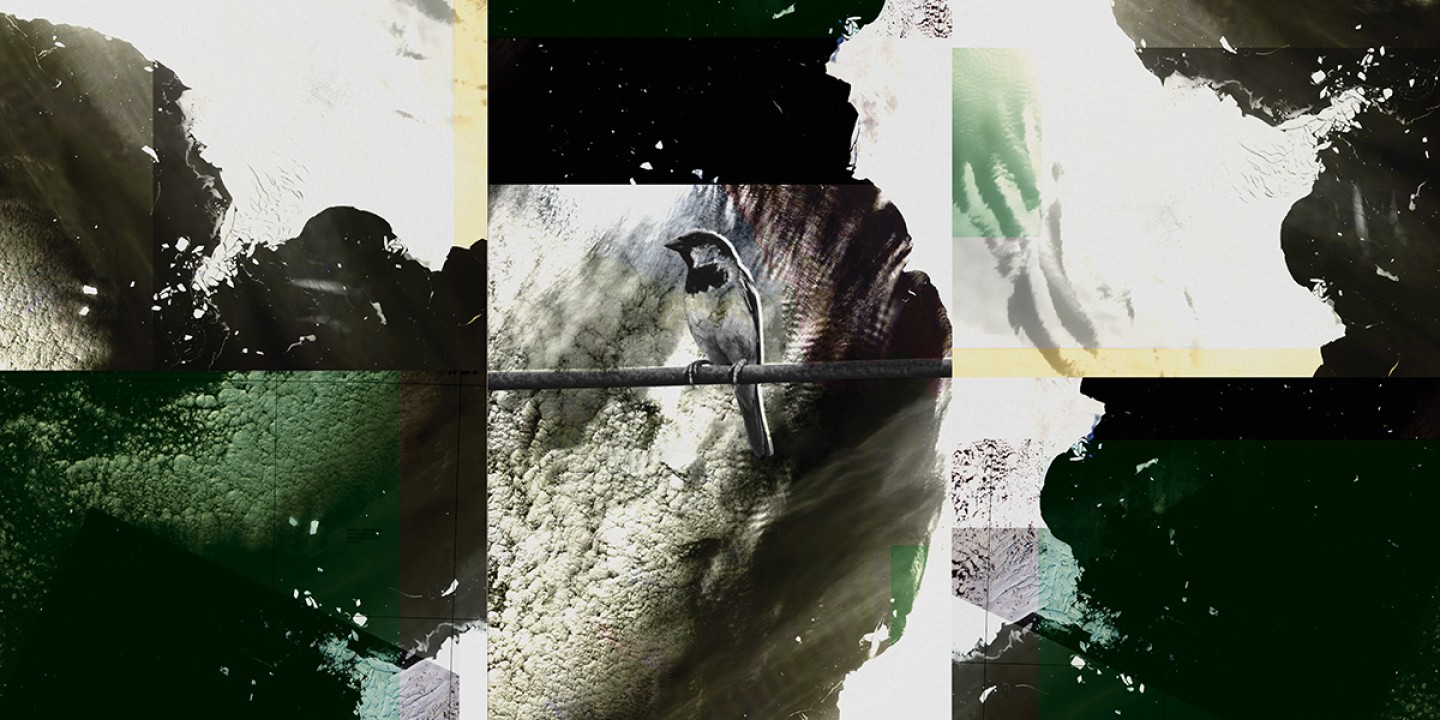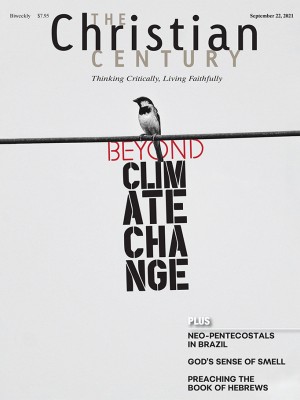
In April, President Biden announced some of the most sweeping climate change regulations in US history. What if it is not enough?
The 51 billion tons of carbon dioxide we pump into the air each year is wrapping an atmospheric blanket around our planet. This blanket is causing sea ice to melt, oceans to rise, storms to intensify, and heat records to be broken annually. The message we keep hearing is that we have to change our ways or these trends will continue.
Tucked away in the pages of scientific journals, a different message is emerging. “We argue that the intervention time left to prevent tipping could already have sunk towards zero,” writes Timothy Lenton of the University of Exeter. Christopher Scotese of the University of Texas agrees: “We are leaving our Ice Age heritage behind. A new, warmer world awaits us.”
Read our latest issue or browse back issues.
The time to prevent climate change, some scientists warn, is past. Now we need to think about adapting, as Earth’s climate systems tip out of the stable state they have been in during the last 10,000 years.
To complicate the picture a bit more, it appears that rapid temperature changes are not unknown in geological history. We live on a planet that does not have a stable climate, and the current “normal” temperatures that have enabled human flourishing over the last 10,000 years are both unusually cold and unusually stable when compared to the last 540 million years over which complex life has evolved.
One surprising fact is that far more time has been spent on earth without polar ice caps than with them: as far as we can tell, for nearly the entire time dinosaurs were on earth (the Triassic, Jurassic, and Cretaceous periods), there were no polar ice caps. Dinosaurs were on earth for a very long time. (I was surprised to learn recently that we are closer in time to T. rexes than T. rexes were to stegosauruses.)
Are we already at a point at which climate change is inevitable? If so, this raises urgent questions about the human role in creation—and the decisions we need to make about the future.
In a landmark 1967 paper, Lynn White Jr. blamed Christian models of dominion—drawn from Genesis 1:26–28—for the environmental crisis. Since then, theologians have been falling over themselves to emphasize that humans are supposed to have a participatory and noncoercive role in the world, not one that flaunts our power over other life. John Zizioulas, T. F. Torrance, and John Chryssavgis emphasize that the human relationship to nature is one of priesthood, of self-sacrificial service and mediation of praise, rather than one of control or dominion. Richard Bauckham insists that we must think of ourselves as a part of the community of creation, but not its master. Clare Palmer writes that “claiming a biblical pedigree for the idea [of stewardship of nature] is at best to oversimplify”; Anne Primavesi calls stewardship exploitative and unecological.
In short, the idea that humans ought to exercise coercive control over the natural world is not popular among theologians. But if earth systems are now beginning a process of rapid change, that puts us in an interesting position. What vision of humanity’s role should guide our actions in a rapidly changing world?
For example, some researchers think that radical geoengineering will be able to fix the problem of climate change. If we spray aerosol particles in the high atmosphere or fertilize the oceans, we could create conditions that would lower Earth’s temperature. If we attempt to use these radical means of geoengineering to halt climate change, we would have to admit that coercive control of the climate is precisely what we are exercising. This would be in contrast to those who first dug up coal and other fossil fuels at industrial levels, who did not have the faintest clue that they could change the composition of the earth’s atmosphere or the seemingly boundless oceans. Geoengineers would be setting out to change the climate.
Geoengineering would constitute a refusal to accept the reality that we live on a planet with an unstable climate. Barring significant volcanic action, if humans had not burned fossil fuels, it is likely that the earth’s temperature would have descended into another major ice age. That too would have been deeply destructive and disruptive, of both global biological diversity and human society. During the last ice age, 12,000 years ago, ice covered most of the United Kingdom and much of northern Europe. A great glacier stretched over all of Canada and down into the United States as far as New York.
If humans today were caught in global cooling instead of global warming, would it be our responsibility to stop it? Is it the human role to prevent climate change altogether? And even if we had the power to control the climate (which at present we do not), would this be a good idea? Would this not be a global policy of “mammals first,” in a world where other creatures have far different optimal conditions? Would we in fact be preventing evolutionary development, trying to preserve a particular and historically unusual climate?
Don’t get me wrong: when I say that climate change is natural, I am not saying it isn’t dangerous. Just the opposite. What we know of previous occurrences of rapid climate change, caused either by large volcanic activities or impacts by meteorites, indicates that they were absolutely devastating for life on Earth. They caused mass extinctions, traumatic events that took the planet hundreds of thousands or even millions of years to recover from. The deeply uncomfortable truth that we must face is that climate change is natural—and so is extinction, death, and suffering. From what we know about climate change in the past, we might want to be getting ready for the grim realities that are coming.
Promethean dreams of controlling the climate forever are well beyond our power. Atmospheric CO2 aside, we are always one asteroid strike or one supervolcano explosion away from rapid and uncontrollable climate change. Just like the reality of our own deaths, the reality of climate change is not a question of if but of how and why and when. Facing reality will mean facing what it means to adapt to a changing climate, whether now or in generations to come.
Adaptation, by which I mean changing to fit new climatic circumstances, can happen one of two ways. We can adapt intentionally and wisely, in ways that ensure justice and well-being for as many as possible, both human and nonhuman. Or we can just let things be, continue life as usual, and allow death and chaos to do the work of forcing adaptation.
We’ve seen examples of these two different adaptation styles with the COVID pandemic. Some countries, such as New Zealand and Australia, took what initially looked like extreme measures and have seen very few deaths. Other countries, such as the United States and the United Kingdom, took less precautionary measures and have seen hundreds of thousands of deaths. Different governing strategies have led to significantly different outcomes, and climate change will be the same story over again.
Like the pandemic, climate change will deeply disrupt the ways we have become accustomed to living. If we do nothing and keep living the way we are used to, it will be a death sentence for hundreds of millions of people and billions of members of other species. To avoid that kind of suffering—and to find a new way to relate to the rest of life on Earth—we need to start preparing for the inevitable.
For humans, we need to begin to create policies that open up our borders to climate refugees, to come up with new technologies that can grow more food on less land, and to help populations migrate away from coastal cities at risk of permanent flooding. For other life, we need to have frank discussions about human population levels (given expected lifestyles and lifespans) and ask what can be done to reduce human impact without imposing unrealistic or draconian measures. More generally, we need to change our views of environmental action from conserving what was to adapting to what is to be. If we instead continue with life as usual, the results will be devastating, especially for those who are already the poorest and most marginal in our world.
If we do give up thinking of ourselves as the masters over creation and climate and see ourselves instead as part of God’s community of creatures on Earth, we again encounter the question of how we should understand our role and our responsibilities toward other life. A thoroughly Christian position might maintain that it is our duty to take up a self-sacrificial stance toward other life—like Jesus, who laid down his life for others, or like John the Baptist, who said of Jesus, “He must increase, I must decrease.” The central importance of humans in the Bible does not mean that humans should live like kings on the back of the rest of creation, looking always and only toward their own flourishing. The Christian model of rulership is just the opposite: the greatest is the one who serves and gives themself up for others.
For now, there is some good news: for the most part, we don’t have to fight over what we should do. The activities we should pursue if we are going to adapt well to climate change are largely the same as what we would do if we were trying to prevent climate change. The urgency of cutting down on carbon emissions remains. We should still plant more trees, use less stuff, eat less meat, and create less carbon dioxide. These actions will slow the rate of climate change, giving all creatures a chance to migrate and adapt to a new normal—and giving us time to invent new technologies that can help all other creatures live well in a new climate.
Even if President Biden’s climate policies turn out to be too little and too late to prevent climate change, they are still desperately needed changes for stepping into a warmer future.






